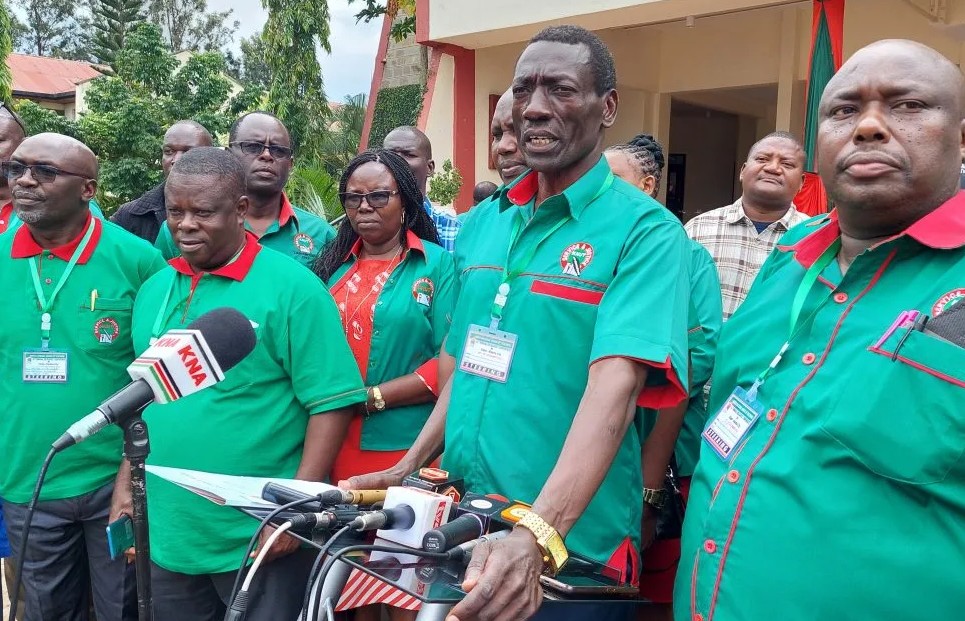The Kenya National Union of Teachers (KNUT) Central Region has strongly opposed proposals by the Kenya Union of Post Primary Education Teachers (KUPPET) to grant Junior Secondary Schools administrative autonomy, saying the move goes against ongoing education reforms.
Speaking during a press briefing in Thika, KNUT Central Region Secretary Mathenge Wanjau said KUPPET’s position contradicts the recommendations of the Presidential Working Party on Education Reforms. The report endorsed the establishment of comprehensive schools bringing together Early Childhood Development Education (ECDE), primary (Grades 1–6), and Junior Secondary (Grades 7–9) under a single head of institution now referred to as a Principal.
“We stand firmly by the reforms that propose one comprehensive school structure. Fragmenting the system would only take us backward,” said Wanjau.
He called on Education Cabinet Secretary Dr. Migos Ogamba and Members of Parliament to fast-track debate on Sessional Paper No. 10 of 2024 and Sessional Paper No. 1 of 2025 to formally anchor the comprehensive school system in law.
At the same event, KNUT National Women Representative Loise Njeri defended the competence of primary school heads, saying they are adequately qualified to oversee the expanded learning structure.
“TSC data shows that nearly 80% of headteachers have attained a Diploma in Management from KEMI, while many others hold Bachelor’s, Master’s, and even PhD degrees,” she said.
Council Chair Charles Ngunjiri urged the Teachers Service Commission (TSC) to reject any meetings with KUPPET officials on the proposed autonomy of Junior Schools, warning that such engagements could undermine the stability of the education sector.
Ngunjiri accused KUPPET of inciting Junior Secondary teachers, funding disorganized protests, and maligning primary school heads instead of fostering unity among educators.
The union also lauded Education CS Dr. Ogamba for advising TSC to retain the current administrative structure that integrates primary and junior levels under one leadership.
“Maintaining the comprehensive model safeguards both learners and teachers and ensures a seamless transition between learning stages,” Wanjau added.
KNUT reaffirmed its commitment to working with the Ministry of Education and Parliament to ensure the full implementation of education reforms aimed at strengthening the Competency-Based Curriculum (CBC) and enhancing efficiency in school administration.







[5714]qdf Casino Philippines: Best Online Slots, Easy Login, Register & App Download Experience top-tier gaming at qdf Casino Philippines! Discover the best qdf slot games with a seamless qdf login and quick qdf register process. Secure your qdf download today to enjoy premium online casino action and big wins anytime, anywhere. Join the #1 qdf casino platform in the Philippines now! visit: qdf
casinos online paypal
References:
https://ninula.com/
paypal casino usa
References:
https://logisticconsultant.net
In 2019, he released his second EP, The Underrated Youth, and the following year, he released
his second studio album, Weird! In 2018, he released his debut EP
Yungblud, followed by his first full-length album 21st Century Liability.
Save my name, email, and website in this browser for the next time I
comment. From quick fixes in the Action Center and keyboard shortcuts to more advanced adjustments using PowerShell or graphics control
panels, there’s a method for everyone.
Users can either set a period for warmer lighting themselves or use sunrise and sunset
times. On computers with external monitors,
the brightness is usually adjusted directly on the monitor instead of the operating system.
Press the brightness key on your keyboard to adjust brightness.
Here’s a step-by-step guide to help you adjust brightness on Windows 10.
If your device has brightness keys on the
keyboard, they might offer an even faster route. Simply access the
Settings menu, navigate to Display options, and tweak the brightness slider until you reach a comfortable level.
References:
https://blackcoin.co/casino-mate-quick-overview/
As a result, it is uncertain whether an Alaska governor may appoint an interim senator to serve until a special election is held
to fill the vacancy. In September 2009, Massachusetts changed its law to enable the governor to appoint a temporary replacement for the late senator
Edward Kennedy until the special election in January 2010.
In Maine and Alaska, ranked-choice voting is used to nominate and elect candidates for federal offices, including the
Senate.
Looking for a convenient and secure car park in Southbank?
But if you obtain Silver status on your Crown Rewards card, you get free parking for 6 months, so long as you spend
about 50 cents at one of the eligible locations. Every time you come and go from Crown Car Park, you will need to
pay again, even if it’s the same day. If
you pass enough money through the machines or tables, you can earn status
points as well as enough points for free parking at Crown on the day.
It’s much closer to Melbourne in general, and thus, parking is at a premium rate of use, up to $45 per day.
A “hold” is placed when the leader’s office is notified that a senator intends
to object to a request for unanimous consent from the Senate to consider or pass a measure.
The presiding officer sometimes uses the gavel of the Senate to maintain order.
The presiding officer enforces the rules of the Senate, and may warn members who deviate
from them.
References:
https://blackcoin.co/45_exclusive-new-jersey-online-poker-vip-programs-compared_rewrite_1/
Von sich erweiternden Wilds des Shrimp-Netzes und Freispielen bis zum Fang des Tages-Pick-Bonus verspricht dieser neue
Slot von Rival Gaming eine gute Zeit. Diese neueren Spiele bieten viele unterhaltsame Bonus-Runden und Freispiele.
Jeder, der daran interessiert ist, sein übliches
kostenloses Slotspiel aufzupeppen, sollte sich zunächst durch die riesige Bibliothek VSOs klicken. Und wenn
Sie nicht aufpassen sollten, so werden Sie unter Umständen viel Zeit mit Spielen vergeuden, die Sie
eventuell gar nicht spielen wollen.
Die meisten Casino Demo Slots bieten zudem detaillierte Informationen über die Gewinnlinien und Auszahlungstabellen an. Es ist jedoch ebenso wichtig zu beachten, dass es
Unterschiede zwischen dem Spielen mit Spielgeld und dem Einsatz von echtem Geld gibt.
Achten Sie darauf, diese Funktionen aktiv auszuprobieren und deren Auswirkungen auf das Spielverhalten zu beobachten. Obwohl Casino Demo Slots kostenlos sind,
können Strategien bei Spielautomaten das Spielerlebnis verbessern. Sobald Sie Ihre Daten eingegeben haben, erhalten Sie oft
eine Bestätigungs-E-Mail, um Ihre Anmeldung abzuschließen. Einige Casinos bieten auch die Möglichkeit,
sich über soziale Medien anzumelden, was den Prozess noch einfacher macht.
References:
https://online-spielhallen.de/umfassende-rant-casino-bewertung-meine-10-jahre-erfahrung-sprechen-bande/